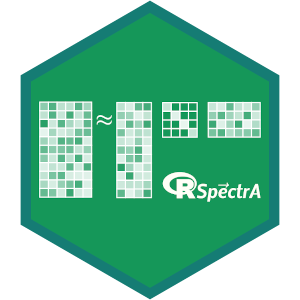
The hardware and bandwidth for this mirror is donated by METANET, the Webhosting and Full Service-Cloud Provider.
If you wish to report a bug, or if you are interested in having us mirror your free-software or open-source project, please feel free to contact us at mirror[@]metanet.ch.

RSpectra is an R interface to the Spectra library. It is typically used
to compute a few eigenvalues/vectors of an n by
n matrix, e.g., the k largest eigen values,
which is usually more efficient than eigen() if
k << n.
Currently this package provides the function eigs() for
eigenvalue/eigenvector problems, and svds() for truncated
SVD. Different matrix types in R, including sparse matrices, are
supported. Below is a list of implemented ones:
matrix (defined in base R)dgeMatrix (defined in Matrix package,
for general matrices)dgCMatrix (defined in Matrix package,
for column oriented sparse matrices)dgRMatrix (defined in Matrix package,
for row oriented sparse matrices)dsyMatrix (defined in Matrix package,
for symmetric matrices)dsCMatrix (defined in Matrix package,
for symmetric column oriented sparse matrices)dsRMatrix (defined in Matrix package,
for symmetric row oriented sparse matrices)function (implicitly specify the matrix by providing a
function that calculates matrix product A %*% x)We first generate some matrices:
library(Matrix)
n = 20
k = 5
set.seed(111)
A1 = matrix(rnorm(n^2), n) ## class "matrix"
A2 = Matrix(A1) ## class "dgeMatrix"General matrices have complex eigenvalues:
eigs(A1, k)
eigs(A2, k, opts = list(retvec = FALSE)) ## eigenvalues onlyRSpectra also works on sparse matrices:
A1[sample(n^2, n^2 / 2)] = 0
A3 = as(A1, "dgCMatrix")
A4 = as(A1, "dgRMatrix")
eigs(A3, k)
eigs(A4, k)Function interface is also supported:
f = function(x, args)
{
as.numeric(args %*% x)
}
eigs(f, k, n = n, args = A3)Symmetric matrices have real eigenvalues.
A5 = crossprod(A1)
eigs_sym(A5, k)To find the smallest (in absolute value) k eigenvalues
of A5, we have two approaches:
eigs_sym(A5, k, which = "SM")
eigs_sym(A5, k, sigma = 0)The results should be the same, but the latter method is far more stable on large matrices.
For SVD problems, you can specify the number of singular values
(k), number of left singular vectors (nu) and
number of right singular vectors(nv).
m = 100
n = 20
k = 5
set.seed(111)
A = matrix(rnorm(m * n), m)
svds(A, k)
svds(t(A), k, nu = 0, nv = 3)Similar to eigs(), svds() supports sparse
matrices:
A[sample(m * n, m * n / 2)] = 0
Asp1 = as(A, "dgCMatrix")
Asp2 = as(A, "dgRMatrix")
svds(Asp1, k)
svds(Asp2, k, nu = 0, nv = 0)and function interface
f = function(x, args)
{
as.numeric(args %*% x)
}
g = function(x, args)
{
as.numeric(crossprod(args, x))
}
svds(f, k, Atrans = g, dim = c(m, n), args = Asp1)These binaries (installable software) and packages are in development.
They may not be fully stable and should be used with caution. We make no claims about them.